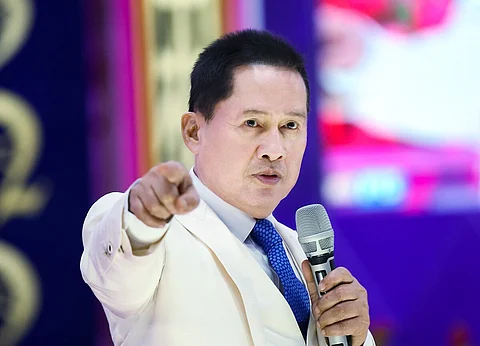
- NEWS
- the EDIT
- COMMENTARY
- BUSINESS
- LIFE
- SHOW
- ACTION
- GLOBAL GOALS
- SNAPS
- DYARYO TIRADA
- MORE

The Department of Justice (DoJ) clarified Wednesday that an individual with pending criminal cases in local courts cannot be extradited, a statement made amid reports of a US request for the extradition of religious leader Pastor Apollo Quiboloy.
The US has formally sought Quiboloy’s extradition, but DoJ officials said his pending criminal cases in the Philippines could delay the process.
DoJ spokesperson Mico Clavano IV said that under Philippine law, a person facing local trial cannot be extradited until the cases are resolved.
“In general, a person cannot be extradited from the Philippines while a criminal case against him is still pending in our courts, since local jurisdiction takes priority,” Clavano said.
He said the rule is that an individual must first face trial and, if convicted, serve their sentence before extradition may proceed. However, Clavano cited that courts have the power to act on cases with urgency to avoid unduly delaying a valid extradition request.
Justice Secretary Jesus Crispin Remulla offered a one-line reply when asked about the matter, stating, “I will know later.”
Philippine Ambassador to Washington Jose Manuel Romualdez reportedly confirmed that US authorities have submitted supporting documents to the DoJ and are awaiting a formal response from Manila.
Reports indicate the US transmitted the request in June, citing charges of sex trafficking of children, conspiracy, fraud and bulk cash smuggling. Quiboloy was indicted by a federal grand jury in 2021 and is on the FBI’s most wanted list.
Quiboloy, founder of the Kingdom of Jesus Christ in Davao City, is facing separate criminal cases in the Philippines, including sexual abuse and human trafficking. He surrendered in September 2024 after weeks of evading arrest and is currently detained at Pasig City Jail.
The Philippines and the US signed an extradition treaty in 1994. The agreement requires all requests to pass through diplomatic channels and be supported by detailed documentation.
Extradition is barred if the offense is political, military, punishable by death in the requesting state, or if the person has already been tried for the same offense in the Philippines.
If approved, Philippine and US authorities would agree on the time and place of Quiboloy’s surrender. If denied, Manila must provide Washington with its reasons.
Quiboloy’s religious empire is headquartered in Davao, where former President Rodrigo Duterte, who is now detained by the International Criminal Court for crimes against humanity, once served as mayor.
